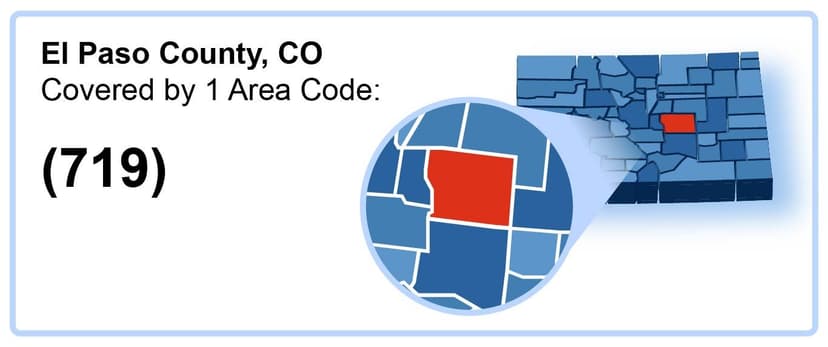What are El Paso County Area Codes?

Following the implementation of the North American Numbering Plan (NANP), several Numbering Plan Areas (NPAs) were created and each assigned a unique NPA code. Area codes, placed at the beginning of 10-digit telephone numbers, identify where phone numbers were registered. The Federal Communications Commission (FCC) delegated the administration of Colorado’s area codes to the Colorado Public Utility Commission (PUC).
One area code currently serves El Paso County.
Area Code 719
Area code 719 was put into service in 1988. It is the telephone area code in the NANP that covers El Paso and other surrounding counties. El Paso County communities in the 719 NPA include Colorado Springs, Manitou Springs, Fountain, and Palmer Lake.
What are the Best Cell Phone Plans in El Paso County?
Wireless and VoIP telephony services continue to displace landlines as the primary means of telecommunication among El Paso County residents. A 2018 CDC survey indicated that 61.4% of Colorado adults were subscribers to wireless-only telephony services in their households. On the other hand, adults residing in landline-only homes came to only about 3% of the demographic.
Cell coverage in Colorado varies significantly among carriers. Verizon has the most comprehensive coverage and covers 81.7% of the state. AT&T’s 80% coverage is a close second. T-Mobile covers 64% of Colorado while Sprint offers only 40% coverage. However, subscribers can always connect to other networks where their preferred network lags, as there are roaming agreements between major carriers.
Voice over Internet Protocol (VoIP) is a telephony service that relies on broadband internet to route calls. Voice, text, and videos are sent as data over the internet. VoIP offers subscribers flexibility, lower phone bills, and improved convenience.
What are El Paso County Phone Scams?
Scammers use telephony services to extort money and obtain personal information from El Paso County residents. These criminals initiate contact with their targets through live calls, automated calls, and text messages while committing phone scams. The Consumer Protection Unit of the Colorado Office of the Attorney General notifies El Paso County residents about the state’s recurrent phone scams. The established cons include:
What are Charity Scams?
Criminals set up fake charities and solicit funds on behalf of these bogus organizations. To deceive their targets, these phony charities bear names similar to those of reputable charities. The naming style presents the fake charities as affiliates of the well-known ones to unsuspecting residents. It is possible to find out if that is true by performing reverse phone lookups on unknown numbers to retrieve information on the entities linked to numbers used by representatives of familiar-sounding charities. El Paso County residents should verify the authenticity of any charity before making donations. Report charity scams to the Attorney General’s Office by filing an online complaint.
What are Business Opportunity Scams?
Scammers entice victims with fake business opportunities that promise high returns in a short time. The fraudsters hurry victims to make immediate decisions by claiming that the window of opportunity is rapidly closing. This gives victims no time to carry out thorough research before funding these investments. Conduct phone number lookups on unrecognized numbers to reveal unknown callers’ identities.
The Federal Trade Commission (FTC) tries to curb this scam by enforcing the Franchise and Business Opportunity Rule. This rule dictates that business sellers must give prospective investors ten days or more before receiving payments. El Paso County residents must carry out any necessary research on proposed businesses within the allowed ten days. Knowledge of this law will enable residents to regard investments that seek urgent funding before the ten days as possible scams. Report business opportunity scams by using the online consumer complaint assistant of the FTC.
What are Family Emergency Scams?
These scams are called grandparent scams because elderly residents are the primary targets. Fraudsters call senior residents and claim to be grandchildren or other relatives in emergencies. Different distress situations, including arrests in foreign countries over drunk driving or car accidents, are usually made up to extort money from targets. A recent variation of this scam involves claiming relatives have been kidnapped with hefty ransoms demanded. Authorities advise Coloradans to set up secret passwords known only to members of the family. This can be used to authenticate identities and guard against imposters. Also, verify the whereabouts of the alleged relatives in distress from trusted third parties before agreeing to any demands. File an online complaint with the Attorney General’s Office to report grandparent scams.
What are Government Imposter Scams?
Fraudsters call El Paso County residents and introduce themselves as representatives of government agencies. They demand payment for bogus debts owed or try to coerce residents to reveal personal information under the guise of routine government checks. Phone spoofing is usually involved to trick the victims into thinking the phone calls originated from the impersonated government agencies. Real government agencies will not demand immediate payment over the phone nor will they seek personal information. Report government imposter scams to the Attorney General’s Office through its online complaint form.
What are Lottery Scams?
News of lotteries won in foreign countries are used to extort victims in this scam. The scammers will convince victims to pay some bogus clearance fees or processing fees before they can redeem their prizes. The United States Postal Inspection Service warns that it is illegal for United States citizens to partake in foreign lotteries. They also warn that most foreign lottery solicitations do not come from approved agencies in foreign countries. Report lottery scams to the Attorney General’s Office.
What are Utility Scams?
These scams involve scammers posing as representatives of utility companies and calling residents to threaten service disconnection if they do not make immediate payments. The scammers recommend unusual payment methods in seeking these payments. Retail gift cards and prepaid debit cards are hard to trace and recover. This is why criminals prefer and recommend them to residents.
Utility companies will not call to threaten service disconnection. Notice of overdue payment gets sent to defaulters by mail before a second mail to notify service interruption gets sent. End calls from alleged utility companies that threaten service disconnection over unpaid fees. Initiate contact with the company directly through a verified number to authenticate any disconnection claim. Use the online consumer complaint form to report utility scams to the Attorney General’s Office.
Hiding behind unknown telephone numbers helps criminals take on any identity that will grant them easy access to targets. Executing phone number searches on these unknown numbers helps to identify criminals by revealing their true identities. Once the “who is this number registered to?” question is answered, irregularities in the information provided by these scammers on the phone are easily spotted. This helps to prevent phone scams from occurring.
What are Robocalls and Spam Calls?
Robocalls are automated calls intended to deliver pre-recorded messages to lots of phone users. Telemarketers use automated dialing machines to place robocalls. The affordability and broad reach of robocalls make them attractive to phone scammers fishing for new victims. For this and other reasons, robocalls are now a menace.
State and Federal laws to combat robocalls have been passed. The Telephone Consumer Protection Act (TCPA) prohibits placing automated calls to anyone without residents’ express consent. The law also recommends harsh punishments to violators. Manufacturers of mobile phone devices developed call filtering and call blocking features to curb robocalls and spam calls abuse. Network operators also offer call-blocking functions to subscribers, sometimes as premium paid services.
Follow these steps to curb robocalls abuse:
- Do not answer calls from unknown and suspicious numbers. Divert such calls to your voicemail and return calls from those that left messages. Treat those that did not leave messages as questionable calls.
- Set up a password for your voicemail box to guard against hacking.
- End telephone calls that turn out to be robocalls without pushing buttons as instructed by the relayed messages. Pushing buttons as instructed leads to more robocalls.
- Make inquiries from your network operator and subscribe to a suitable call blocking tool.
- Download third-party call blocking apps and use them if service is not affordable or unavailable from the network provider.
- Register on the Colorado Do Not Call List and the National Do Not Call Register. Legitimate telemarketers do not call numbers on both lists.
- Report persistent robocalls abuse to the PUC and the FTC.
How to Spot and Report El Paso County Phone Scams?
Preventing phone scams is easy for El Paso County residents that can recognize how scammers operate and set up their numerous schemes. The FTC provides some guidelines and warns residents to be wary of phone calls that involve:
- Calls purportedly from government agencies that threaten arrests over unpaid taxes or fees. These phone calls do not originate from authentic government agencies and are mostly scams. Government agencies, like the IRS, will not initiate contact with defaulters over the phone.
- Requests to pay for clearance taxes or processing fees before redemption of prizes allegedly won. There are no prizes to be won, and payments made are forfeited to the criminals.
- Business opportunities that will not give you enough time to carry out due diligence and consider every risk. Hurrying up victims’ decisions are scammers’ way of clouding their judgement.
- Supposed official transactions that demand payments via unconventional means like gift cards, prepaid debit cards, and wire transfers. These payment methods are hard to trace and recover once funds are sent, and this is why scammers prefer them.
- Unsolicited calls from government agencies seeking confirmation of personal information. Never share your sensitive data with individuals or alleged government agencies over unsolicited calls.
It is generally accepted that educating citizens on different phone scams will help them avoid becoming victims of these scams. The following government agencies offer scam alerts and offer El Paso County residents platforms to report criminal activities:
The Federal Trade Commission (FTC) protects consumers’ interests. They provide instructions that help residents identify common phone scams and avoid robocalls. The FTC manages the National Do Not Call Registry, which notifies legitimate telemarketers not to disturb you if your phone number is on the list. Report any phone scam incident to the FTC by using the online consumer complaint assistant.
The Federal Communications Commission (FCC) oversees the telecommunications industry. The FCC’s guidelines on how to identify spoofing and activate call blocking help residents to avoid scams. Together with telephone carriers, the FCC seeks ways to improve caller authentication and eradicate caller ID spoofing. Spoofing and other phone scams can be reported to the FCC online.
The Colorado Attorney General’s Office has a Consumer Protection Unit that educates Colorado residents on scams. The unit offers scam alerts that highlight prevalent scams in the state periodically. Report phone scams to the Attorney General’s Office by filing online complaints or calling (720) 508-6000. Alternatively, submit reports in person at the Ralph L. Carr Judicial Building, where the Attorney General’s Office is located. The building is at 1300 Broadway, 10th Floor, Denver, CO 80203.
The El Paso County Sheriff’s Office dedicates the Investigative Division to resolve crimes including phone scams. A number of scam alerts have been released and archived by the Sheriff’s Office. Call (719) 390-5555 or submit an online report with the El Paso County Sheriff’s Office to resolve phone scam incidents.
